Holding the Maslenitsa.
Contents
- What is the beginning of the Shrovetide and how long is the pancake week?
- How is the People's Carnival celebrated in Russia?
- How are the children celebrating the Shrovetide?
- Pancakes on the Russian Pancake Day
- Last Day of the Orthodox Maslenitsa - Forgiveness Sunday: the essence and rite of the holiday
- How are you congratulated on the Russian Carnival and Forgiven Sunday?
- Video: History, traditions Carnival in Russia
In this article you will learn about the celebration of Maslenitsa in 2017.
What is the beginning of the Shrovetide and how long is the pancake week?
One of the most loved in the people of the holidays is Shrovetide. With impatience waiting for him and adults and children. After all, traditionally, he associates us with merry festivities, various amusements, sledding, tasty treats, among which a special place is occupied by pancakes.
This holiday is rooted in the times of paganism. According to some historians, initially it was timed to coincide with the vernal equinox and symbolized the meeting of spring and the beginning of field work.
When Christianity came to Russia, the holiday was moved to an earlier period, so that it did not coincide with Lent. Therefore, we meet with warmth and welcome spring, we are often in severe frosts.
IMPORTANT: Carnival is celebrated in the last week, which precedes the Great Post.
In Christianity this period is considered to be the time for:
- forgiveness of all offenses
- reconciliation with your neighbors
- preparing the soul and body for the path of repentance to the Lord
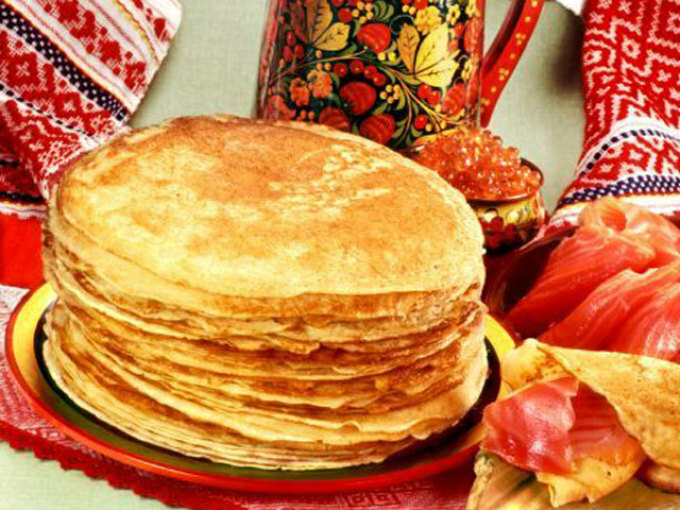 The main product of Maslenitsa
The main product of Maslenitsa Not everyone knows that on such holidays meat is not used ,also Meat or Cheese Week. And a lot and plentifully you can eat:
- different fish
- eggs
- dairy products
- flour products
Every year the day on which Maslenitsa begins falls on different numbers, as it depends on the day of the Great Lent before Easter Light. In the coming 2017, this day falls on on February 20 .Last week Maslenitsa will be 7 days, ending February 26.
Preparation for the pancake week traditionally begins the day before on the previous Saturday, called Meat. On this day they commemorate the deceased and visit the cemeteries. He was also called "Little Maslenka" and was the beginning of the Maslenitsa meeting. Fun festivals in this festive period occur all the days, each of which has a special meaning and an appropriate name.
Monday - Maslenitsa meeting, when preparations were underway for the holiday:
- swings and booths were built.
- was filled with ice rinks and ice slides.
- was made a scarecrow from straw and installed on the city square.
- sang the call letters, which invited the spring and called the sun.
- started baking pancakes, the first of which was given to beggars.
- sent a daughter-in-law to her parents to cook and wait for the matchmakers to visit.
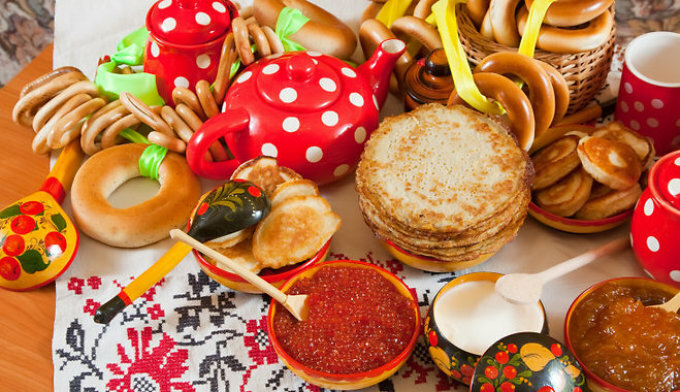 Beginning of the holiday
Beginning of the holiday Tuesday - "Flirting" was called and was always devoted to the young:
- guys were arranged bride's grooms.
- young people exchanged notes, flirting with each other.
- slept on a sleigh, decorated with bells and ribbons.
- drove around the city decorated with ribbons wheel.
- drove around the scarecrow around the scarecrow.
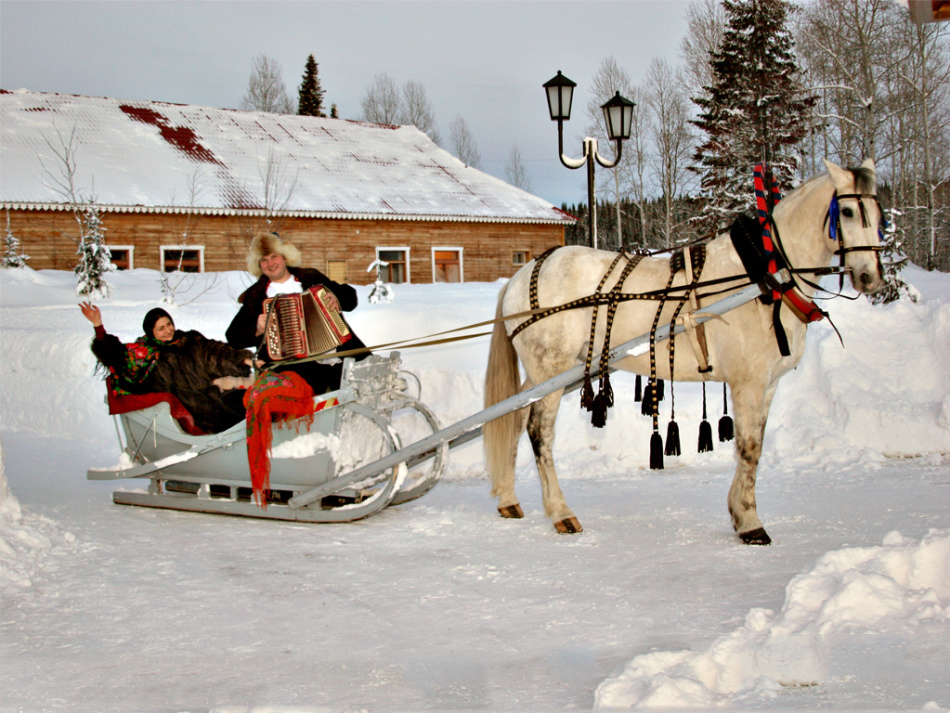 On Tuesday they arranged pokatushki on sleighs
On Tuesday they arranged pokatushki on sleighs Wednesday - the day of "gourmet", in which:
- mother-in-law called for pancakes.
- recent newlyweds wore wedding dresses and toured all the guests who were at their wedding.
- arranged especially generous feasts.
- brewed beer.
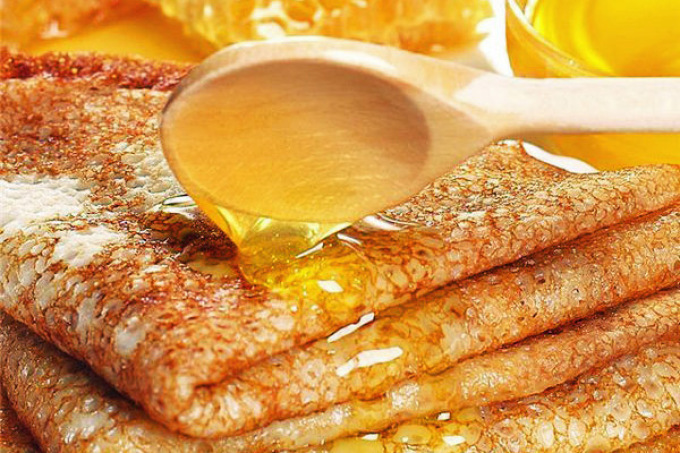 The generous feasts
The generous feasts Thursday - "binge" day was, the beginning of the Shrove Carnival, when there was an exit of all the negative energy accumulated during the long winter, and the fun was happening on a special scale:
- fisticuffs were arranged.
- stormed the snow towns.
- rolled down the slides of ice.
- jumped through the bonfires.
- sang songs carnivorous.
- went to visit from house to house.
- children ran with carols, begging for gifts.
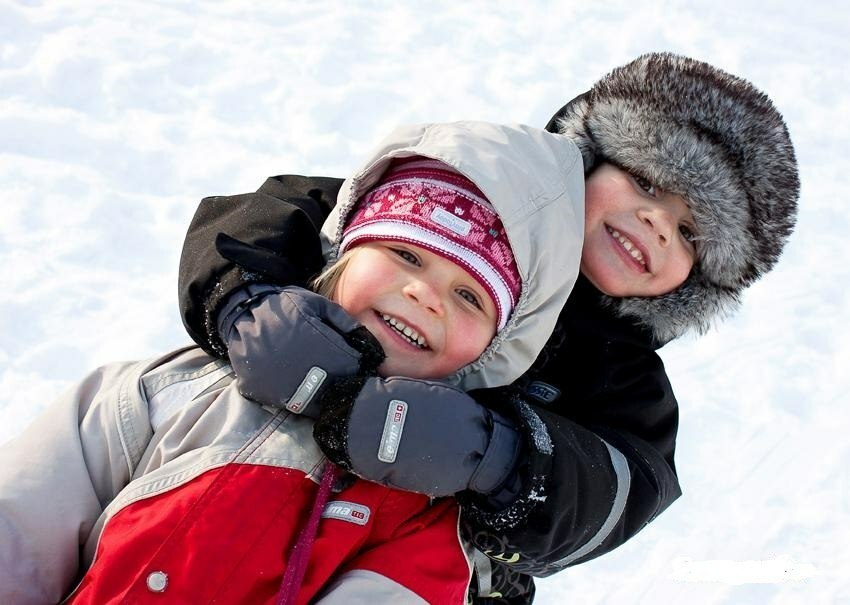 On Thursday, we rolled on ice-slides
On Thursday, we rolled on ice-slides Friday - Vespers Teschiny:
- the son-in-law invited the mother-in-law to the pancakes
- mother-in-law beforehand sent the products for cooking
Saturday - zolovkin gatherings:
- the daughter-in-law was invited to visit her husband's relatives.
- gilded flowers had to be presented with gifts.
- stuffed Shrovetide put on sledges, catalyzed around the city.
- in the evening they started building a fire to burn the scarecrow.
- were chanting around the fire.
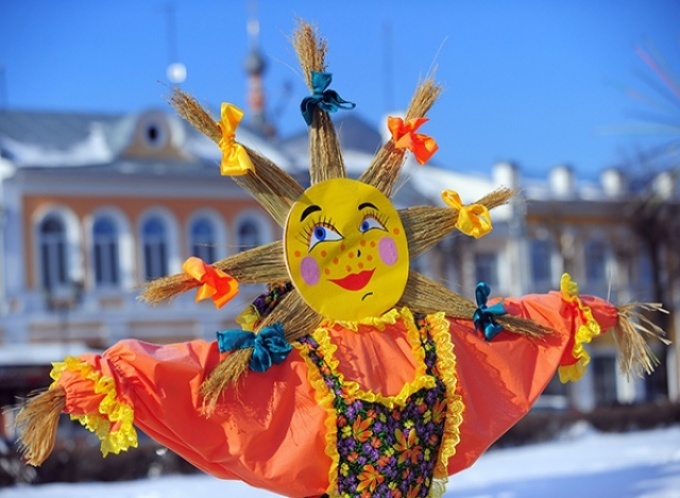 On Saturday they started to build a scarecrow
On Saturday they started to build a scarecrow Sunday - A lover, Seeing off, Forgiven:
- pancakes were taken to the cemeteries to remember the deceased relatives.
- asked each other forgiveness.
- visited the bath.
- the remains of the festive meal were burnt.
- ash from Maslenichnogo stuffed waving on the field for a good harvest.
- was cleansed spiritually, preparing for the upcoming post.
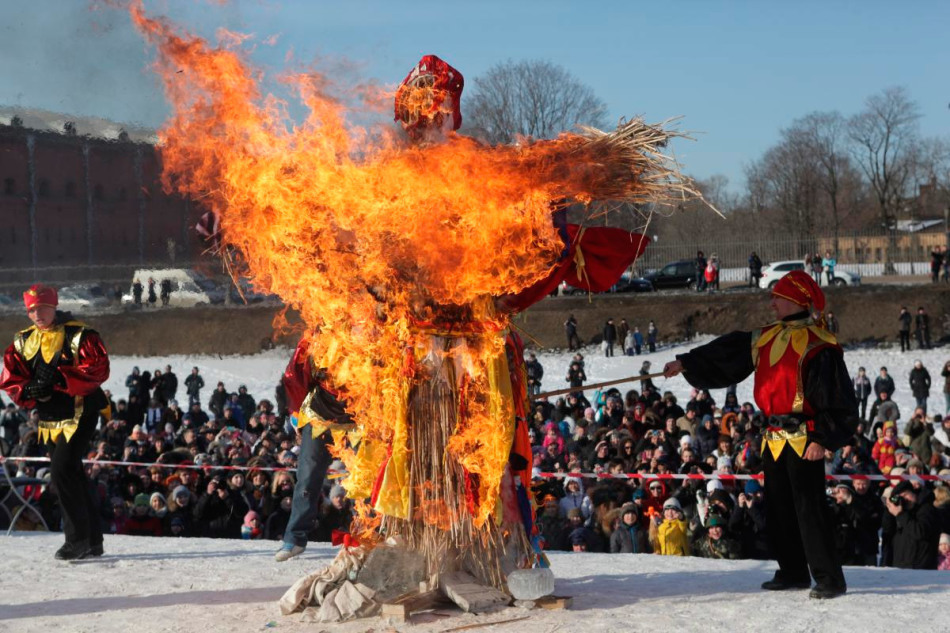 The Scarecrow had to be burned
The Scarecrow had to be burned How is the People's Carnival celebrated in Russia?
With confidence, we can say that Pancake week is the most cheerful and noisy holiday in our country. He celebrated with a wide scope in Russia in the old days. And in modern days people walk long and bright.
Foreigners always try to visit Russia these days to see traditional Shrovetide festivals and even participate in them. After all, the Shrovetide festival reflects the culture of the Russian people, its originality.
Of course, now some Shrovetide ceremonies have lost their significance, but interest in the national holiday has not lost in our time. The bright atmosphere seems to bring us back to childhood, giving us the opportunity to escape from our daily worries.
In all regions of Russia fairs are held in the squares, swings are established, plays are played, folk songs are sung and tasty pancakes are treated. In some small towns joke fisticuffs and riding on a troika of harnessed horses can be arranged.
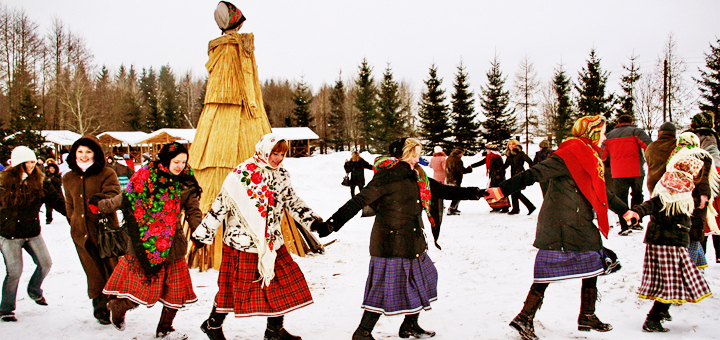 Maslenitsa - a cheerful holiday
Maslenitsa - a cheerful holiday Activists and travel agencies try to support folk traditions, organizing Maslenitsa tours to the ancient cities of Russia. More details about the celebration of Maslenitsa you can read in this article.
One should not forget that Pancake week is not only a noisy party, but also a family warm holiday, which strengthens relations between close people. In fact these days it is necessary to congratulate relatives and invite them to visit.
How are the children celebrating the Pancake Day?
The cheerful and noisy celebration of the people's Maslenitsa leaves vivid impressions in children. Attractions, competitions, buffoons, sweets - all this makes an indelible impression on the guys and is remembered forever.
The meaning of the holiday is not clear to the kids, so we need to explain to them why we are so happy about the arrival of the "Meatfed week", and what it means for the Slavs. It is very important to talk about the holiday in an understandable, accessible language for children.
Explain to them when Maslenitsa is celebrated, how many days it takes and how to behave this week. Will help you with this article.
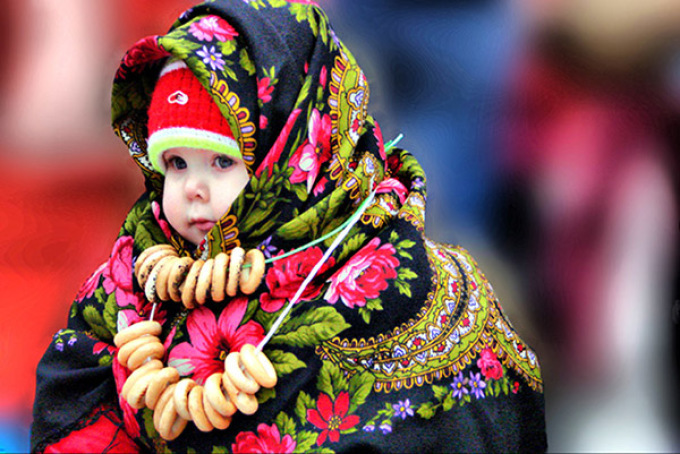 Children in Maslenitsu
Children in Maslenitsu Now almost all kindergartens are held folkloric matinees or themed classes on the theme of Maslenitsa. Create a festive atmosphere will help simple ways:
- folk costumes for children.
- multicolored caps for boys and scarves for girls.
- folk songs and ancient games.
- co-production of stuffed animals.
- tea-drinking with samovar and pancakes.
Game games and competitions are an indispensable attribute of the Maslenitsa festivities. Bring your children to the Russian traditions, this brings up respect for your country and people.
Pancakes on Russian Pancake Day
Indispensable attribute of the Russian folk Maslenitsa - round appetizing pancakes. Yellow and round, hot and hearty - they symbolize the sun, after which everyone is so bored during the long winter.
This dish has been enjoyed in Russia for a long time. Originally it was called "mlyn" from the word "grind" and "moved", and was a dish for the remembrance of the deceased.
Approximately in the XIX century, it became the main food in Shrovetide days, as this holiday is considered to be the wires, "wake" of the winter period. How can there be no popular delicacy: pancakes are coveted and yeast, with and without baking, with cream and protein, buckwheat and wheat, pancakes and pyshki.
Each housewife has her own favorite and proven way of cooking for years. But if you have not yet found your "corporate" recipe for pancakes, use the tips suggested in the article.
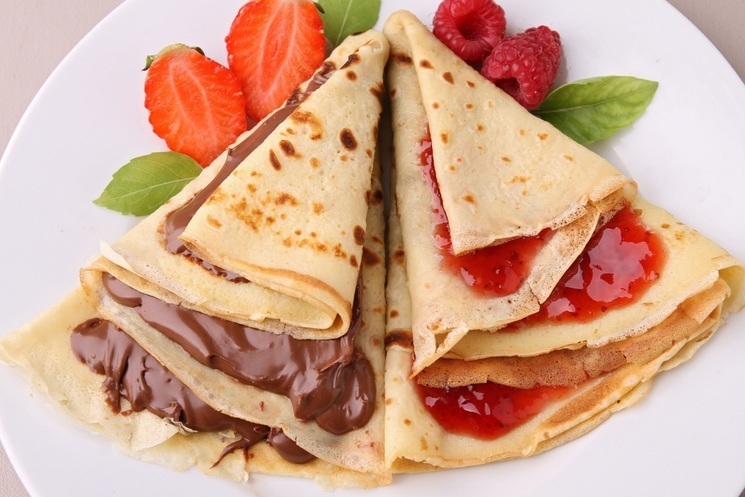 Delicious pancakes
Delicious pancakes Even in the event that you do not like to cook, on these holidays necessarily bake pancakes and please yourself and your family. And in any case, do not diet!
Still have time to get in shape for the beach period. Do not forget that according to the Russian tradition, the more pancakes you eat in the Siphose Week, the richer and happier you will live this whole year.
The Last Day of the Orthodox Maslenitsa - Forgiveness Sunday: the essence and rite of the holiday
It is known that everyone's favorite Maslenitsa is not a religious holiday, it is not in the church calendar. Just the Orthodox Church filled it with a special spiritual meaning.
Before Easter Bright Orthodox people observe the most strict post. There are many temptations in the world, it's hard to refuse them immediately, so Cheese Week is gradually preparing a person for the upcoming humble behavior and restrictions of all kinds. Meat products at this time already there is no, but indulge in fun and you can and should.
Shrovetide festivities come to an end in the daytime, which is called in different ways: The week is salty, the Kissewinner, The seeing-off and, more habitually for us, Forgiven Sunday. This day is special - it's the last one before the Great Lent. The festivities are already coming to an end, and people in the post enter with a clean soul.
The traditions of the Sunday of Forgiveness come from the custom of the ancient monks of Palestine. Before Easter, they were alone for 40 days( the entire Great Lent) went into the desert, in order to strengthen the strength of their prayers and spiritually purify themselves.
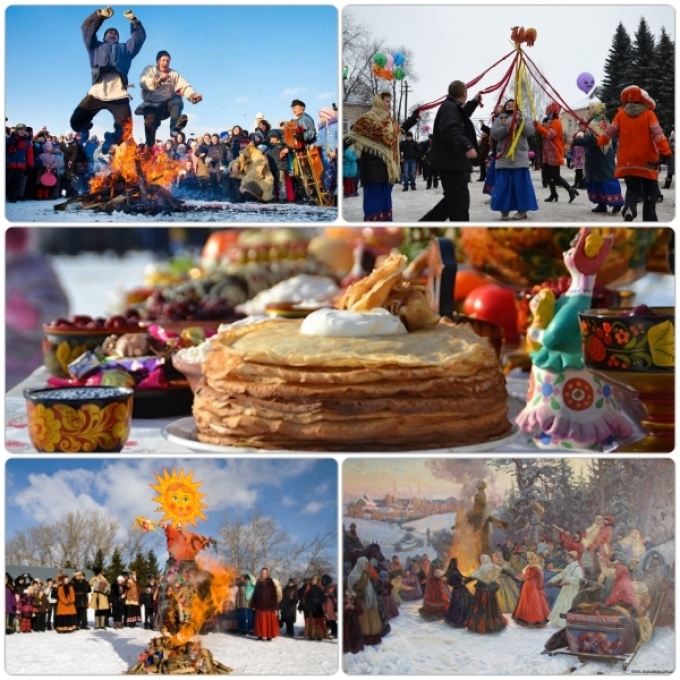 Stroll on the last day of Maslenitsa
Stroll on the last day of Maslenitsa Many of them died of thirst, or from attacks of snakes and beasts. The monks understood that not everyone could come back from the desert, so they asked each other in advance for forgiveness for all the bad deeds that they did or could have done.
The laymen adopted this tradition, and on the last shrovetide day they ask each other for forgiveness and forgive their offenses themselves. They apply all possible measures in order to reconcile with those with whom they oppose.
It is believed that you can only aspire to God by eradicating in your heart anger, resentment and condemnation of someone. It is necessary not only to forgive people who hurt us, but also to sincerely ask forgiveness from neighbors for bad deeds, what we did in life or in our thoughts.
If you did not manage to see the person who wanted to apologize, do it mentally. Forgiveness is also being asked this day for those who left the world in another, because people are often late with apologies. In the old days during the Forgiveness of Sunday, this custom was followed:
- was a group of several people in the cemetery, while remaining completely silent.
- did near the graves three deep bow.
- put memorial food brought from home( necessarily pancakes).
- asked the deceased to forgive.
- went home in silence.
In addition, traditionally on such a day:
- recent newlyweds toured their parents and godparents, gifted with different gifts.
- the newly-made parents had to visit the kulaks and congratulate them.
- family sat down to the table seven times.
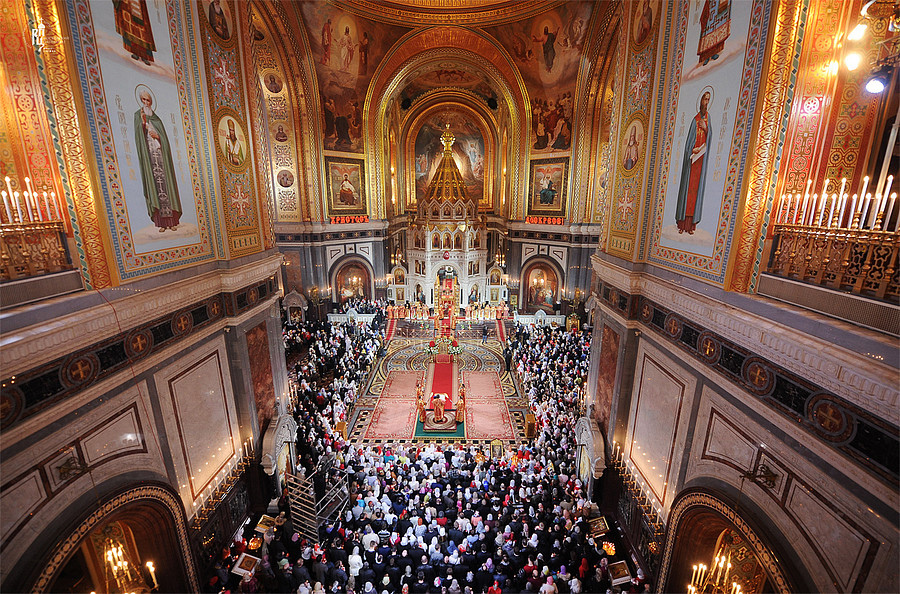 Sunday service is held
Sunday service is held Long since the last Maslenitsa Russian day must pass this way:
- festive amusements and fun quiet down gradually and come to an end.
- is burning a straw stuffed pancake week.
- in the evening after the end of all Maslenitsa festivities in Orthodox churches service is performed.
- at the end of the rite is Chin Pardon: priests with parishioners ask forgiveness from each other, bowing at the same time to their feet and in response hearing the traditional words: "God will forgive, and I forgive."
- after the end of the evening service people go to the guests "say goodbye" and give alms to beggars.
- at home, the whole family sits down at a meal, the last before the Great Lent, which is called "corncakes".
- after dinner, the household reads a prayer and apologizes: the younger ones in front of the elders, the spouses among themselves.
- cheerful holiday of the Russian Carnival is now considered complete.
- is the beginning of Lent
How are you congratulated on Russian Carnival and Forgiven Sunday?
During the Carnival, people rejoice, have fun, say goodbye to the bored cold and believe that spring will come very soon and will bring not only the long-awaited warmth, but also many more good things. Be sure to congratulate your relatives on this holiday, give them gifts and sincere words.
How in olden times we congratulated each other on Forgiveness Sunday, and what words were said while doing this, read in this article.
Forgiveness Sunday is a holiday when we gather our relatives at the table and can express our warm feelings and say kind words without hesitation. Previously, similar holiday messages were written on postcards. Now this tradition is gradually disappearing.
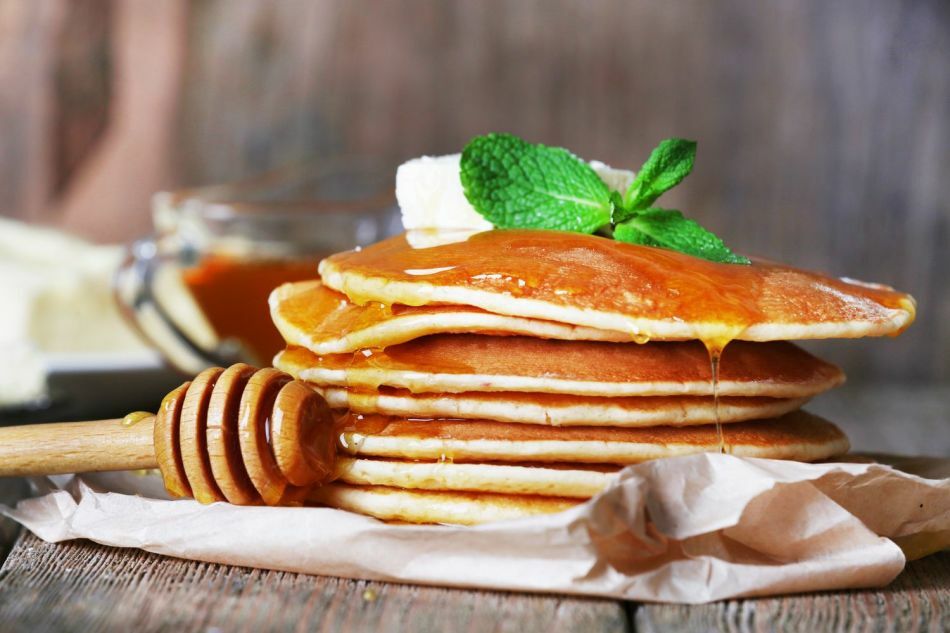 Pancake pancakes
Pancake pancakes As a rule, we write sms or call on the phone. But you will agree, the beautiful picture on the Shrovetide theme looks nice and touching. And to receive such always it is pleasant. Honor folk traditions, keep faith in good, appreciate loved ones and congratulate them on Carnival and Forgiven Sunday!
